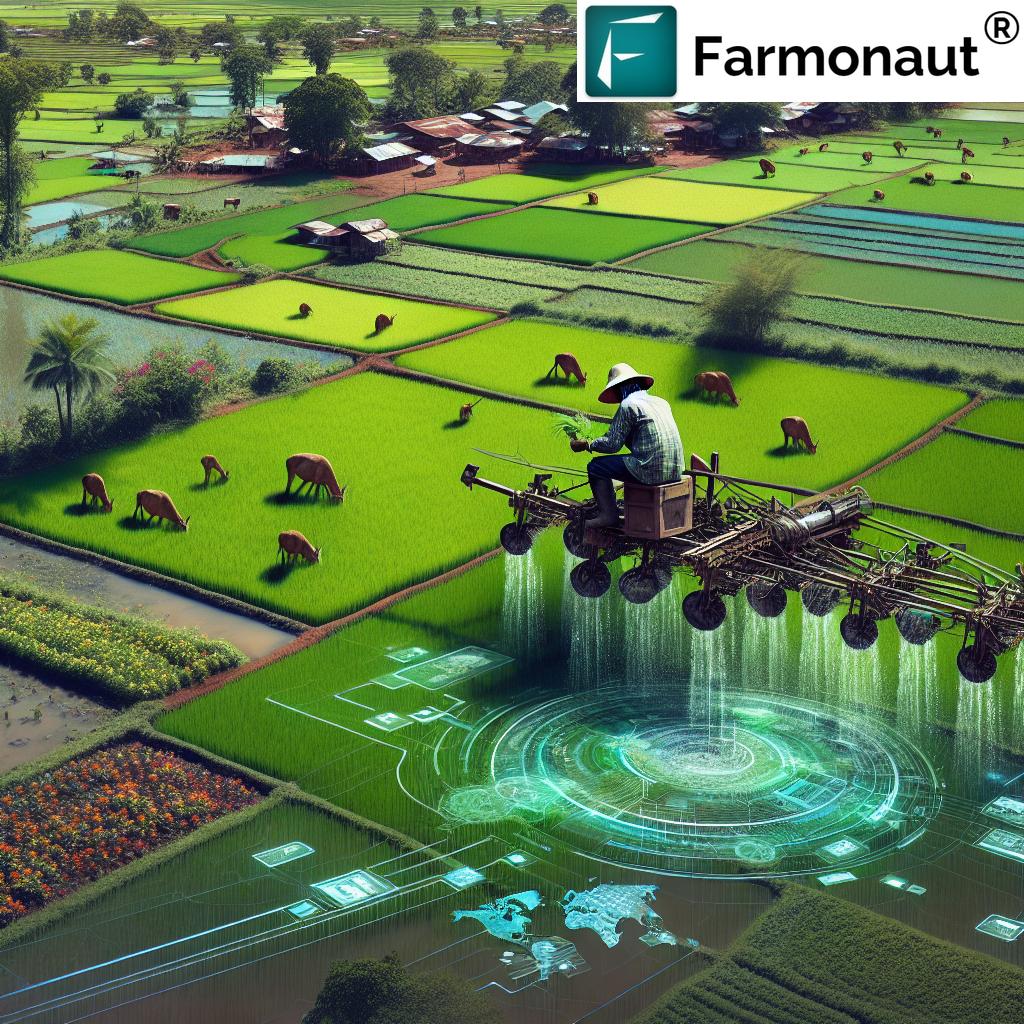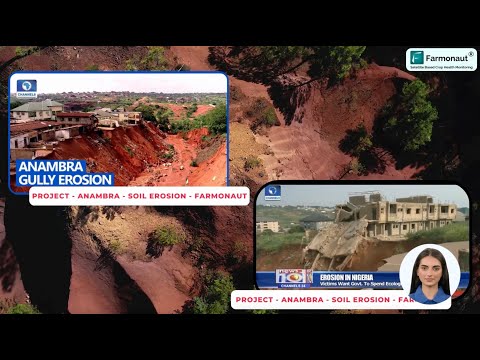Transforming Cambodian Agriculture: Sustainable Practices and Modern Techniques Boost Rural Development in Tahen

“Tahen village in Cambodia’s Battambang province saw a 30% increase in crop yields after implementing sustainable agriculture practices.”
In the heart of Cambodia’s western region, a remarkable transformation is taking place. We’re witnessing the dawn of a new era in Cambodian agriculture, where sustainable practices and modern techniques are revolutionizing rural development. Our focus today is on Tahen village in Battambang prefecture, where an innovative agricultural project is changing the lives of local farmers and reshaping the landscape of rural Cambodia.
As we delve into this fascinating journey of agricultural transformation, we’ll explore how the combination of education, mentorship, and the implementation of cutting-edge farming technologies is empowering farmers and boosting rural development. From the introduction of irrigation systems for rice crops to the application of GIS in agriculture, we’ll uncover the multifaceted approach that’s driving this change.
The Seeds of Change: Introducing Sustainable Agriculture Practices
The agricultural project in Tahen village is a shining example of how sustainable agriculture practices can transform rural communities. By educating and mentoring farmers in advanced crop management strategies, the project is laying the foundation for long-term success and prosperity.
- Implementation of modern irrigation systems for rice crops
- Introduction of mechanized farming techniques
- Application of GIS (Geographic Information Systems) in agriculture
- Promotion of crop diversification strategies
These initiatives are not just about improving crop yields; they’re about creating a sustainable future for Cambodian agriculture. By embracing these practices, farmers in Tahen are reducing their environmental impact while increasing their productivity and profitability.
Irrigation: The Lifeblood of Modern Agriculture
One of the cornerstones of this agricultural transformation is the implementation of modern irrigation systems. In the past, farmers in Tahen relied heavily on rain-fed agriculture, which made them vulnerable to the whims of weather patterns. Now, with the introduction of efficient irrigation systems, they can ensure a steady water supply for their rice crops throughout the growing season.
The benefits of these irrigation systems are manifold:
- Increased crop yields
- Improved water efficiency
- Reduced vulnerability to drought
- Extended growing seasons
While the completion of the irrigation system faced some delays due to the pandemic, the project continues to make significant progress. Farmers are already seeing the positive impacts of this investment in water management infrastructure.
Mechanization: Boosting Efficiency and Productivity
Another key aspect of the agricultural transformation in Tahen is the introduction of mechanized farming techniques. The shift from traditional, labor-intensive methods to modern, mechanized approaches is revolutionizing the way farmers work their land.
The benefits of mechanized farming include:
- Increased productivity
- Reduced physical labor
- Improved precision in planting and harvesting
- More efficient use of resources
As part of the project, farmers are being trained in the use of modern agricultural machinery. This not only improves their efficiency but also opens up new opportunities for diversification and scaling up their operations.
GIS in Agriculture: Precision Farming for the Future
The application of Geographic Information Systems (GIS) in agriculture is another exciting development in Tahen. This technology is helping farmers make more informed decisions about land use, crop selection, and resource allocation.
“GIS technology adoption in Cambodian agriculture led to a 25% improvement in resource allocation and farm management efficiency.”
GIS offers several advantages for modern farming:
- Precise mapping of farmland
- Soil analysis and management
- Crop yield prediction
- Pest and disease monitoring
By leveraging GIS technology, farmers in Tahen are able to optimize their farming practices, leading to improved yields and more sustainable land use.

Crop Diversification: Spreading Risk and Increasing Income
One of the key strategies being promoted in Tahen is crop diversification. By moving away from mono-cropping and embracing a more varied approach to agriculture, farmers are able to spread their risk and increase their income potential.
Benefits of crop diversification include:
- Improved soil health
- Reduced pest and disease pressure
- Enhanced income stability
- Increased food security
The project is providing farmers with the knowledge and resources they need to successfully diversify their crops, opening up new markets and opportunities for growth.
The Role of Agricultural Development Funds
None of these transformative changes would be possible without the support of agricultural development funds. These funds play a crucial role in driving rural farm management and enabling the implementation of modern, sustainable farming practices.
Key areas where these funds are making a difference:
- Infrastructure development (e.g., irrigation systems)
- Farmer education and training programs
- Access to modern farming equipment
- Research and development of sustainable farming techniques
By strategically allocating these funds, the project is able to address the most pressing needs of the farming community in Tahen and create a foundation for long-term success.
Educating and Mentoring Farmers: The Key to Sustainable Change
At the heart of this agricultural transformation is a commitment to educating and mentoring farmers. By providing local farmers with the knowledge and skills they need to adopt modern farming techniques, the project is ensuring that the changes implemented are sustainable in the long term.
Key aspects of the education and mentoring program include:
- Training in sustainable agriculture practices
- Workshops on modern farming techniques
- One-on-one mentoring sessions
- Field demonstrations and hands-on learning experiences
This focus on education is empowering farmers to take control of their own development and become active participants in the transformation of their community.
Herbicide Usage: Balancing Productivity and Sustainability
The project in Tahen is also addressing the complex issue of herbicide usage in agriculture. While herbicides can be an effective tool for weed management, their use must be balanced with environmental concerns and long-term sustainability goals.
The approach to herbicide usage in Tahen includes:
- Education on proper application techniques
- Promotion of integrated weed management strategies
- Introduction of more environmentally friendly herbicide options
- Encouragement of non-chemical weed control methods where possible
By taking a balanced approach to herbicide usage, the project is helping farmers improve their productivity while minimizing potential negative impacts on the environment.
Learning from Neighbors: The Thailand Connection
As part of the project, farmers from Tahen have had the opportunity to visit farms in Thailand to learn about advanced agricultural practices. These cross-border exchanges have proven invaluable in exposing Cambodian farmers to new ideas and techniques.
Benefits of the Thailand farm visits:
- Exposure to advanced farming technologies
- Insights into successful crop diversification strategies
- Networking opportunities with experienced farmers
- Inspiration for implementing new practices back home
These visits have not only provided practical knowledge but have also motivated farmers in Tahen to push the boundaries of what’s possible in their own farming operations.
Overcoming Challenges: The Path to Progress
While the agricultural project in Tahen has made significant strides, it hasn’t been without its challenges. The COVID-19 pandemic, in particular, caused delays in the completion of the irrigation system and disrupted some of the planned educational programs.
However, the resilience of the local farming community and the dedication of the project team have allowed progress to continue despite these setbacks. By adapting to the new realities and finding innovative solutions, the project has maintained its momentum and continues to drive positive change in Tahen.
The Role of Technology in Modern Agriculture
As we’ve seen throughout this exploration of the agricultural transformation in Tahen, technology plays a crucial role in modern, sustainable farming. From GIS applications to mechanized farming equipment, technology is helping farmers work more efficiently and make better-informed decisions.
One company at the forefront of this technological revolution in agriculture is Farmonaut. Their satellite-based farm management solutions are helping farmers around the world optimize their operations and improve their yields.
Explore Farmonaut’s innovative solutions:
For developers interested in integrating Farmonaut’s technology:
Download Farmonaut’s mobile apps:
The Future of Cambodian Agriculture
As we look to the future, the agricultural transformation taking place in Tahen village offers a glimpse of what’s possible for the broader Cambodian agricultural sector. By embracing sustainable practices, leveraging modern technologies, and investing in farmer education, Cambodia has the potential to become a leader in sustainable agriculture in Southeast Asia.
Key areas of focus for the future:
- Continued investment in agricultural infrastructure
- Expansion of sustainable farming practices to other regions
- Further integration of technology in farming operations
- Development of value-added agricultural products
- Strengthening of agricultural export capabilities
With continued support and investment, the seeds of change planted in Tahen village have the potential to grow into a nationwide agricultural revolution, transforming rural communities and boosting Cambodia’s economic development.
Conclusion: A Bright Future for Tahen and Beyond
The agricultural project in Tahen village is more than just an isolated success story; it’s a blueprint for sustainable rural development that has the potential to transform agriculture across Cambodia and beyond. By combining sustainable practices, modern techniques, and a focus on education and mentorship, this project is empowering farmers and creating a foundation for long-term prosperity.
As we’ve seen, the implementation of irrigation systems, mechanized farming, GIS technology, and crop diversification strategies are already yielding impressive results. These changes are not only improving crop yields and farmer incomes but are also promoting more sustainable and resilient agricultural practices.
The journey of transformation in Tahen is far from over, but the progress made so far is truly inspiring. It serves as a powerful reminder of what can be achieved when farmers are given the tools, knowledge, and support they need to succeed in the modern agricultural landscape.
As we look to the future, we can be optimistic about the prospects for Cambodian agriculture. The seeds of change planted in Tahen are already bearing fruit, and with continued investment and support, they have the potential to spark a nationwide agricultural revolution that will benefit generations to come.
Farmonaut Subscriptions
FAQ Section
Q: What are the main sustainable agriculture practices being implemented in Tahen village?
A: The main sustainable practices include modern irrigation systems for rice crops, mechanized farming techniques, application of GIS in agriculture, and crop diversification strategies.
Q: How has the agricultural project in Tahen village impacted crop yields?
A: Tahen village has seen a 30% increase in crop yields after implementing sustainable agriculture practices.
Q: What role does education play in this agricultural transformation?
A: Education is crucial. The project focuses on training and mentoring farmers in advanced crop management strategies, sustainable practices, and the use of modern farming technologies.
Q: How has GIS technology improved farming in Tahen?
A: GIS technology has led to a 25% improvement in resource allocation and farm management efficiency, helping farmers make more informed decisions about land use and crop management.
Q: What challenges has the project faced?
A: The COVID-19 pandemic caused delays in completing the irrigation system and disrupted some educational programs. However, the project has shown resilience and continues to make progress despite these setbacks.
| Traditional Methods | Modern Techniques | Benefits |
|---|---|---|
| Rain-dependent farming | Modern irrigation systems | Increased crop yields, water efficiency |
| Manual labor | Mechanized farming | Improved productivity, reduced physical strain |
| Mono-cropping | Crop diversification | Improved soil health, income stability |
| Intuition-based farming | GIS application | Optimized resource allocation, data-driven decisions |
This transformation in Tahen village serves as a beacon of hope for rural development across Cambodia. By embracing sustainable practices and modern techniques, farmers are not just improving their livelihoods but also contributing to the long-term sustainability of agriculture in the region. As these practices spread and evolve, we can look forward to a more prosperous and sustainable future for Cambodian agriculture.






